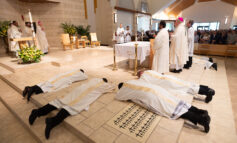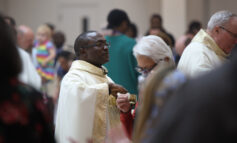By Father Thomas Esposito
Special to The Texas Catholic
One theme in the Bible is the social character of sin. Sin is a reality that affects the people of God as a people; that is, it is something that emerges inside the human heart but that ultimately extends far beyond — it is both in our hearts and “out there” in our customs and institutions as a people. We shape each other and our world, for better and for worse, through our interior lives. Sin is for that reason connected to authority, since power can shape the extent to which sin is able to embed itself in society.
It is, therefore, no surprise that the Bible holds the kings of Israel responsible for leading the people of God in and out of sin. Many kings are judged negatively because their own sin causes or confirms sin in others (2 Kgs 13:2, 6, 11; 14:24). The few kings judged positively are praised not simply for their own justice but for the justice they bring to the People of God through religious and moral reform (2 Kgs 18:1-8; 23:25).
But even good kings fall short in the Bible, since they are often unable to follow the Lord with their “whole heart” as King David, the most celebrated king in the Old Testament, is said to have done (1 Kgs 14:8). A good example is King Jehu, whose zeal for the Lord brings him to purify Israel from the pagan worship of Baal introduced by his predecessor on the throne, King Ahab (1 Kgs 16:30-33; 2 Kgs 10:17-27). And yet, in spite of his devotion, Jehu was not a perfect king: “Jehu destroyed Baal in Israel. However, Jehu did not desist from the sins which Jeroboam, son of Nebat, had caused Israel to commit, the golden calves at Bethel and at Dan” (2 Kgs 10:29). Thus, while Jehu overcame the sins of one predecessor (Ahab), he was not able to overcome the sins of another (Jeroboam), and so the People of God continued to suffer in sin. Even King Josiah, perhaps the greatest king since David himself, could not make up for the sins of his predecessor, King Manasseh (2 Kgs 23:25-26).
There is a tragic element to kingship in the Old Testament. Israel longs for a king whose “whole heart” is turned to the Lord, a king whose “judgment” comes from God and who will “govern with justice” to rescue the poor and the oppressed, to establish his rule of peace and prosperity “from sea to sea” (Ps 72). But this beautiful hope is tragically disappointed, again and again, as each generation and king struggles and fails to overcome the sins of former generations and kings. Each failure proves again and again that it is impossible to start da capo in the exercise of our freedom. We bear in ourselves the sins of others; that is, we are affected by them; they exist in our cultures, customs, laws and institutions. And we, affected as we are, time and again prove incapable of overcoming our conditioning. We cannot cure ourselves of our infection with hands that bear the disease.
We are conditioned by all human beings. As Pope Benedict XVI once said, from the perspective of Christian faith, “every man … contains the past and future of mankind, … one single ‘Adam’” (Introduction to Christianity, 247). This truth certainly reveals the pain of original sin, but it also reveals the beauty of the Christ — the beauty of grace and the gift of a new beginning for our kind. Our sins lead to desolation, to the leveling of the vine of God’s People; but in the face of such a tragedy, the Gospel message resounds: “But a shoot shall sprout from the stump of Jesse and from his roots a bud shall blossom” (Is 11:1). On Easter morning, God gives us a king — the word “Christ” means “Anointed One” or “King” — and he put “the ends of the earth” in the “possession” (Ps 2:8) of this king crowned with thorns, the true jewels of regal love, making him “the source of eternal salvation for all who obey him” (Heb 5:9), for all who follow his docile and persevering rule of love.
Father Thomas Esposito, O.Cist., is a theologian and monk at the Cistercian Abbey of Our Lady of Dallas in Irving. His column will appear occasionally in The Texas Catholic.



